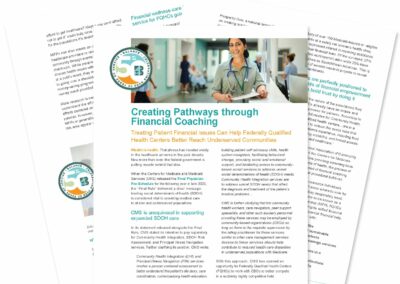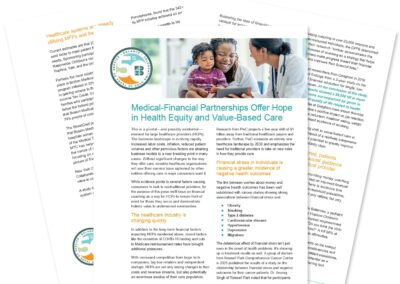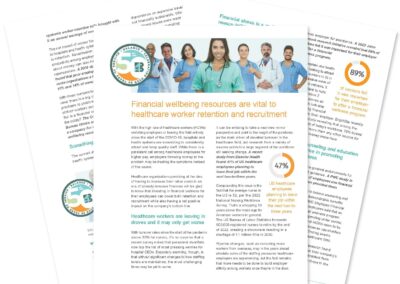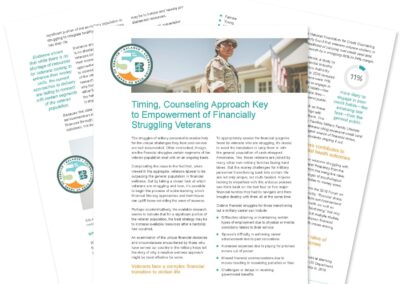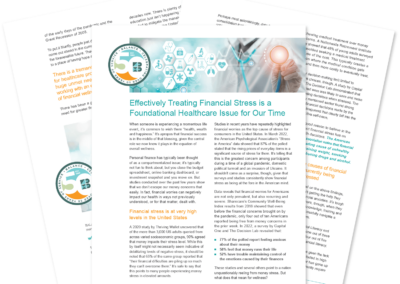Medical-Financial Partnerships Offer Hope in Health Equity and Value-Based Care
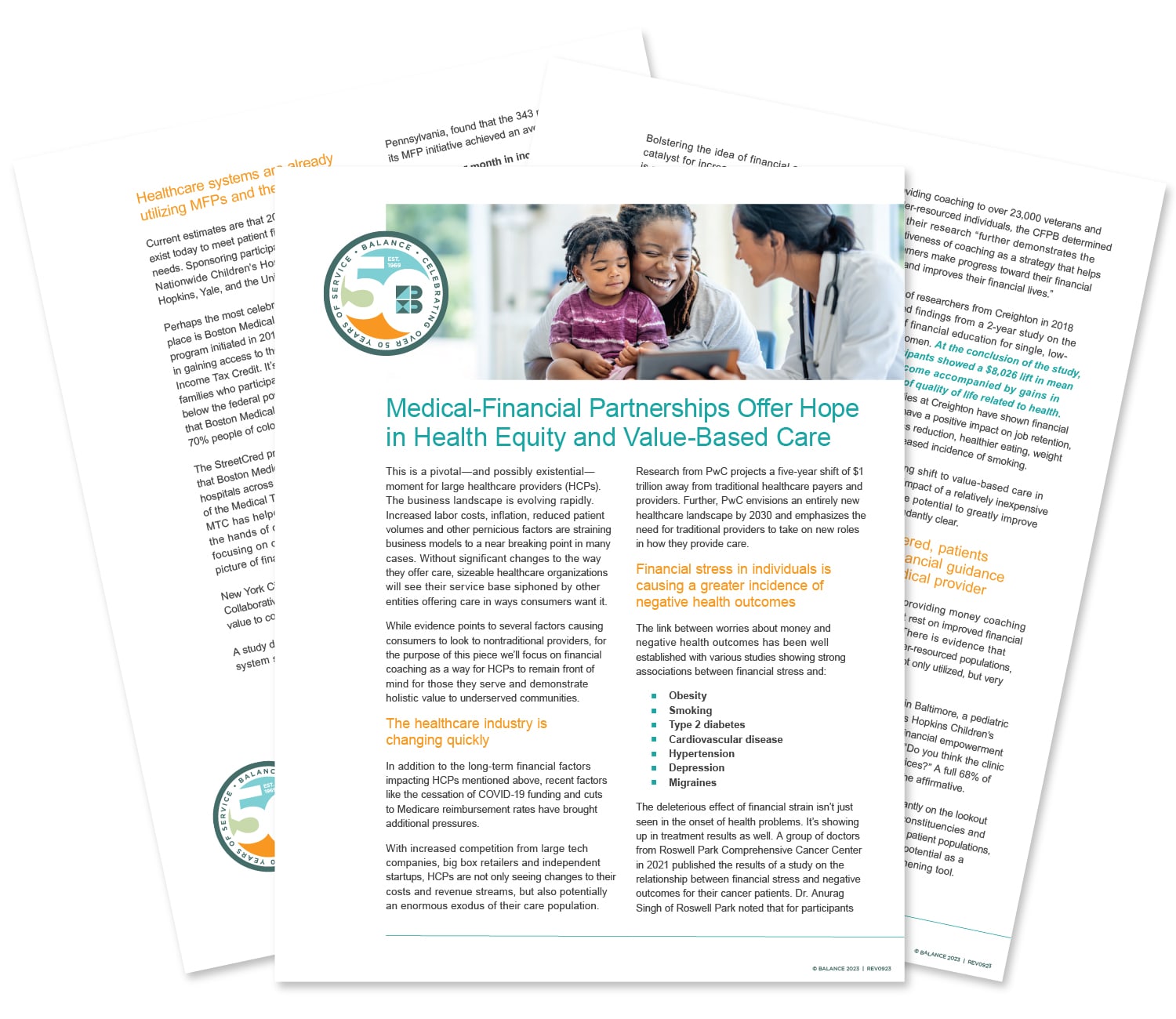
Thank you for your interest in our white paper, Medical-Financial Partnerships Offer Hope in Health Equity and Value-Based Care.
Please click the button below to view and download the white paper or continue to read the summarized web version.
Related Resources
This is a crucial moment for large healthcare providers (HCPs) as the business landscape is rapidly changing. Rising labor costs, inflation, reduced patient volumes, and other challenges are pushing their business models to the brink. Without adapting their care delivery, these organizations risk losing patients to more consumer-friendly alternatives. In this piece, we’ll explore how financial coaching can help HCPs stay relevant and provide holistic value to underserved communities.
The healthcare industry is changing quickly
Apart from ongoing financial challenges, recent events like the cessation of COVID-19 funding and Medicare rate cuts are compounding pressures. Healthcare providers also face growing competition from tech giants, retail chains, and startups, putting their financial stability and patient base at risk. PwC’s research predicts a $1 trillion shift away from traditional providers in the next five years, requiring them to adapt their roles in care delivery to navigate the impending healthcare landscape transformation by 2030.
Financial stress is causing more negative health outcomes in individuals
The link between worries about money and negative health outcomes has been well established with various studies showing strong associations between financial stress and:
- Obesity
- Smoking
- Type 2 Diabetes
- Cardiovascular disease
- Hypertension
- Depression
- Migraines
In 2021, a study from Roswell Park Comprehensive Cancer Center found that cancer patients facing financial stress have a roughly double risk of dying, as noted by Dr. Anurag Singh:
“If you are worried about your finances, your risk of dying is roughly double.”
With stagnant wages, inflation, debt, housing costs, and ongoing financial effects of COVID-19, these stressors persist. They may contribute to a looming health crisis, impacting a significant portion of the population, as up to 70% of Americans report financial stress.
People are avoiding treatments because they feel they can’t afford it
According to a 2022 Gallup poll,
%
of Americans said they or a family member had foregone medical treatments due to the cost.
While some point to COVID-19 as a main cause for this statistic, it seems more likely that inflation and wage stagnation are contributing just as much.
Financial guidance is needed broadly
Reducing the issue of people avoiding medical care solely to income oversimplifies the situation. While income is a factor, financial literacy plays a crucial role.
In 2022, financial illiteracy cost the average American adult $1,819, according to a survey conducted by the National Financial Educators Council. As The Ascent’s research found, poor credit alone can cost someone $1,420 per year.
Combined with research showing Americans spend around $18,000 annually on nonessentials, there is untapped potential to allocate funds for healthcare. Some effectively manage their money, but many miss opportunities due to a lack of financial knowledge.
Financial coaching can help maintain higher appointment attendance
In 2022, Creighton University researchers found that participation in a financial coaching program reduced the proportion of subjects avoiding medical care due to finances from 49% to 33%. (Download the White Paper to read more of the story)
Financial coaching works to improve outcomes, especially for financially at-risk individuals and families
Recent studies emphasize financial coaching’s transformative potential. In a 2015 study funded by the Consumer Financial Protection Bureau (CFPB) and Annie E. Casey Foundation, coaching improved savings by an average of $1,187, raised credit scores by 21 points, and reduced debt by $10,644 for low- and moderate-income recipients. The 2021 CFPB study, based on data from coaching over 23,000 veterans and under-resourced individuals, further confirmed coaching’s effectiveness in helping consumers reach financial goals. (More success stories and statistics found inside the white paper!)
When it’s offered, patients appreciate financial guidance from their medical provider
At the Harriet Lane Clinic in Baltimore, a pediatric primary care clinic of Johns Hopkins Children’s Center, participants in the financial empowerment program were asked, “Do you think the clinic should provide financial services?”
%
of those asked said "Yes."
Health Equity: Financial Coaching and Funding Opportunities
In 2018, Dr. Elizabeth Brondolo, chair of a 2018 American Psychological Association working group on stress, highlighted the impact of socio-economic status, race, and ethnicity on health disparities, emphasizing the correlation between wealth and health, stating,
“Good health is not equally distributed. Socio-economic status, race and ethnicity affect health status and are associated with substantial disparities in health outcomes across the lifespan. And stress is one of the top 10 social determinants of health inequities.”
Financial coaching has proven to enhance access to care for marginalized communities, as evidenced by various studies. Not only does improving health equity provide comprehensive care, but it also holds substantial business potential, with health disparities costing hospitals an estimated $230 billion annually.
Funding to combat health inequities has surpassed $24 billion from various sources, including state, federal, private, and charitable funds, as highlighted in a 2023 report by The Chartis Group. The National Institute on Minority Health and Health Disparities (NIMHD) is committed to acting as a funding pipeline for health equity projects.
Additionally, Dr. Lucy Marcil’s 2021 report underscores the untapped potential of corporate partnerships and revenue-generating social enterprise models for medical-financial partnerships, opening new funding possibilities.
Enhancing Healthcare with MFPs: A Natural Response and Proven Success
Medical-Financial Partnerships (MFPs) have emerged as a response to the changing healthcare landscape. These collaborations, as described by Dr. Orly Bell of UCLA, aim to reduce patient financial stress. They have gained support from the American Academy of Pediatricians and the American Hospital Association, emphasizing the importance of offering financial counseling to patients.
Healthcare systems are actively adopting MFPs, with approximately 20 to 30 distinct partnerships currently in place. Institutions such as Nationwide Children’s Hospital, UCLA, Johns Hopkins, Yale, and the University of Texas at Austin are participating. One notable success story is Boston Medical Center’s StreetCred program, initiated in 2016, which assists eligible patients in gaining access to the Earned Income Tax Credit.
The StreetCred program’s expansion to hospitals across the country through the Medical Tax Collaborative (MTC) has put over $14 million in the hands of more than 6,000 families, enhancing financial wellness.
MFP initiatives have a significant impact. New York City Health and Hospitals, a Medical Tax Collaborative member, calculated a 673% value-to-cost ratio. A study conducted by ProMedica, a nonprofit healthcare system, found that MFP participants achieved an average of:
- $793 per month in increased net income
- A 69-point increase in credit scores
These financial enhancements are highly beneficial, particularly for participants with a median adjusted gross income of just over $25,000 per year.
The time is now for MFPs
“They’re really hurting financially,” is a phrase that in the past we understood as a metaphor. Now we know that Americans are literally experiencing physical pain and poor health because of their money stress.
Furthermore, a concerning downward spiral is forming as people avoid treatment, leading to worsened health issues. Disparities persist for people of color and those on the financial margins. With health systems aiming to expand their reach in a rapidly evolving landscape, it makes sense to turn to approaches that keep patients engaged in improving their health.
With available funding and promising returns, Medical-Financial Partnerships are poised to be invaluable in the next generation of wellness tools offered by healthcare systems.
